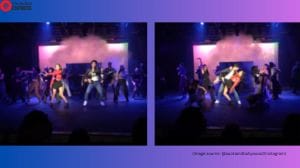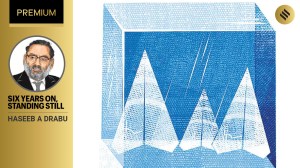Stay updated with the latest - Click here to follow us on Instagram
Aligarh Muslim University team wins $5000 Facebook funding for web extension that counters extremist content
Calling themselves Team Moderators, the AMU students showcased an NLP based browser extension that analyses content on news portals and blogs on the Internet and ranks them on a Polarisation Index.
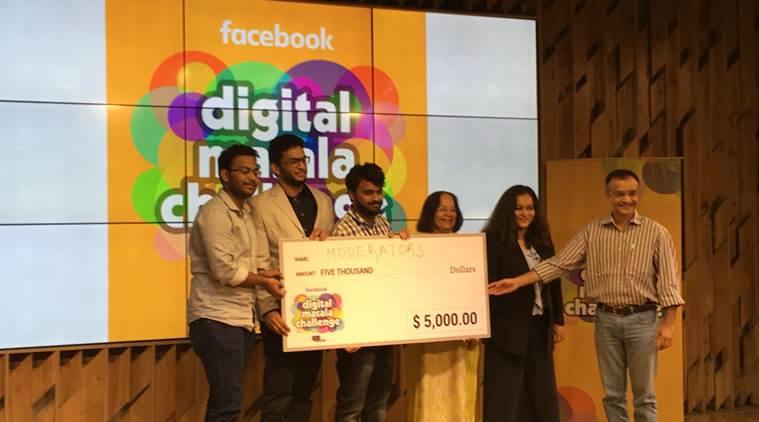 AMU’s Team Moderators with jury (Express Photo)
AMU’s Team Moderators with jury (Express Photo)
A team from Aligarh Muslim University won $5000 in funding from Facebook for developing a prototype web extension that could help counter violent and extremist content on the Internet. They were among four other groups of students and young professionals from across the country shortlisted to pitch their ideas at Digital Masala Challenge – a hackathon organised by web portal Youth Ki Awaaz on Saturday. From a web series to a bot, each brought to the table unique ideas to counter the narrative of extremism rapidly spreading across social networks.
With terror organisations and other right-wing groups taking to social media and mobile messaging services to recruit vulnerable youth, the debate over how best to monitor digital spaces without violating privacy norms has left many struggling to find solutions.
Calling themselves Team Moderators, the AMU students showcased an NLP based browser extension that analyses content on news portals and blogs on the Internet and ranks them on a Polarisation Index.
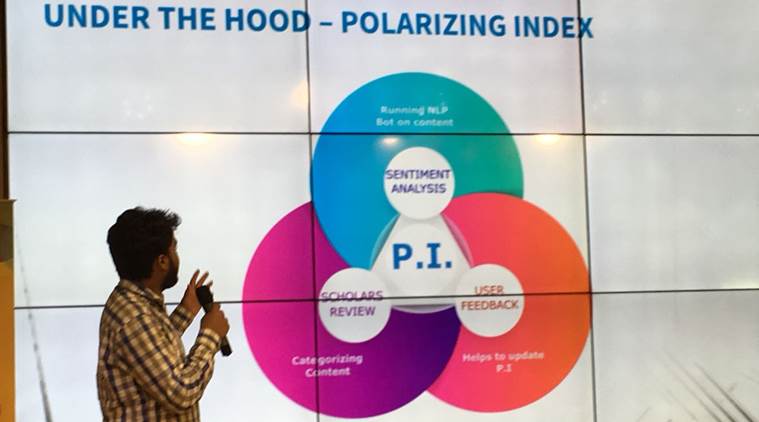 (Express Photo)
(Express Photo)
How does it work?
A group of experts – yet to be identified – will have access to the developer dashboard of the extension and can then rate popular articles or those that are going viral on a scale of 1 – 10. This, based on how polarised the content is. The extension also offers readers the related articles from reputed news websites. The concern, though, is a likely bias of those rating the content.
“We will have a process of identifying people who can be a part of the moderators but that will be worked out eventually,” says Hamza Khan, who along with Ashar Shahid and Baqir Khan spent the last 48 hours fine-tuning their product.
Anvyaya, a group of journalism and media students from the national capital, pitched the idea of creating a web series to counter those shared by extremist groups that seek to radicalise youth by either showcasing a world of luxury or those urging them to join the caliphate and bring about ‘much-deserved justice’ which they’ve been ‘wrongfully denied’.
Students from Ashoka University developed a bot which could help identify a user’s needs using Natural Language Processing (NLP) – the artificial intelligence that makes a computer programme converse in an almost human-like approach. The bot would respond to those who feel angered or threatened by what they construe as injustice or alienation in society. For example, the bot would throw up links to counter misinformation of how a Muslim could feel threatened praying publicly in a Hindu-dominated neighbourhood in Mumbai. Aside from the bot, the group also pitched the idea of sharing real-life experiences of those who were lured by militant groups and have been deradicalised.
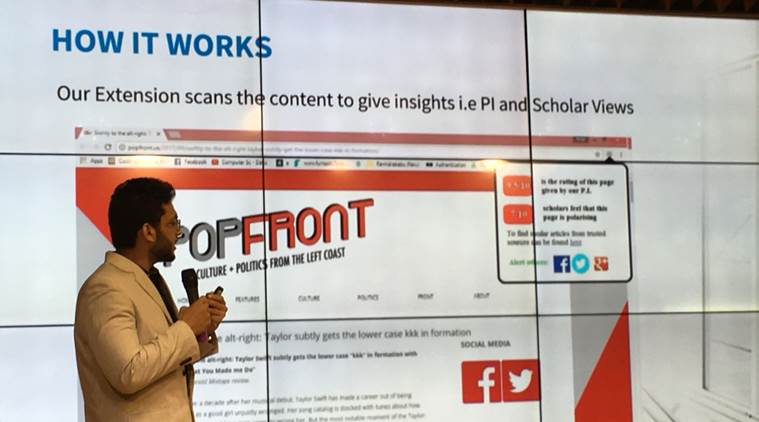 (Express Photo)
(Express Photo)
Shivnath Thukral, Facebook’s Public Policy Director, and a jury at the event, said the need of the hour was a solution that created immediate impact, where the solution offered by The Moderators fitted well. “It’s up to us to expand the counter hate narrative and create a community of people who can identify content that is troublesome and Facebook will work on more products that will help do that,” he said.
Sushobha Barve, executive director at the Centre for Dialogue and Reconciliation, and a member of the jury at the hackathon, said online communities were the need of the hour as there is very little that cyber police officials can do to counter hate. “A lot is spreading through Facebook pages and WhatsApp groups and there’s little police can do. While they largely look at identifying culprits, people need to stand up as a community and help counter the narrative by stopping the spread of misinformation.”
Others that presented were an Instagram group called India In Black that hopes to create social change and community leaders through photo walks across the country, and PLUC – People Like Us Create – a mobile journalism startup informing audiences and urging them to report extremist content using the hashtag #HateCheck as well as by building an online community that immediately responds to misinformation with facts.










